GIFS (below).
Click on each for the gif and to download.
The first chase scene comes about 30 minutes into the new Charlie’s Angels. It’s a bit that could easily fit within the world of Bond or Bourne — an armored vehicle is equipped with what can only be described as an uzi, a motorcycle brings up the rear. Bullets are exchanged, some of them deadly. The scenario takes place in Hamburg, Germany (after a pre-credits opener in Rio). But then the spies gather in an empty field, waiting for their handler, and the whole thing culminates in…a hug.
“I was adamant that there be hugging in the movie,” says the film’s writer-director Elizabeth Banks, 45, who also plays the Bosley administering the embrace in question. “That’s what distinguishes Charlie’s Angels from James Bond, Jason Bourne, Mission: Impossible. This is what you get to do in the girl version of this movie that draws you in because it feels real. It is real. I cry at work.”
This installment of the franchise, which Banks explains began in 1976 as a two-hour Movie of the Week before it was greenlit for a hit ABC TV series for five seasons, sits somewhere between a reboot and a sequel. The idea came from a set piece during an episode: A sign at the offices of the Townsend Agency that listed satellite offices in Hawaii and elsewhere. As Banks began research for the script she found herself wondering about those outposts (“They did set [some of] of the show in Hawaii, which I believe was just to get them in bikinis,” she jokes) and what an international Townsend Agency might look like nearly 40 years later. Her 2019 version answers that question.
It’s made clear in the trailer: This is a global spy thriller. Naomi Scott is Elena, a programmer in charge of launching a new sustainable energy source that can be weaponized if it’s placed in the wrong hands. Angels Sabina (Kristen Stewart) and Jane (Ella Balinska) are tasked with protecting her as she attempts to blow the whistle on Brok Industries, and wind up welcoming her into the Angels fold as the case gets a lot more complicated. It’s rooted in the same universe as the rest of the installments, and it makes use of many of the same tropes (“Good morning, Charlie!”), but Banks also knew there were elements she wanted to leave behind. Instead of the opening vignettes in McG’s 2000 version that served as biographies for Natalie , Dylan, and Alex (played by Cameron Diaz, Drew Barrymore, and Lucy Liu, respectively), the entire film is an origin story.
“I felt that those beginnings were a way to apologize for the fact that these women were doing a job that you weren’t used to women doing,” she says. “Versus 18 years later I don’t need to explain how she got her f—ing skills. As audiences we accept that women can do anything.”
Five years ago, inside the corporate offices of Sony Pictures, executives had realized that the business was transitioning to a franchise-first model — let’s acknowledge, and then skirt right past, the clear existential questions this presents for the movie industry — and evaluated their own catalogue for beloved brands to mine for future use. Charlie’s Angels was a clear winner according to Doug Belgrad, one of the film’s producers who was president of Sony Pictures Motion Picture Group at the time. Also clear was the need for the franchise to, at long last, be run by women. Banks was their first choice, a decision owed in part to her work on Pitch Perfect 2, says producer Elizabeth Cantillon: “She brings the expertise of someone who created destination moviegoing, about women.”
Banks wrote the role of Sabina for Kristen Stewart, knowing the character was going to be the Funny One — the 40 Year-Old Virgin and Pitch Perfect star also knew she would be lending some of her own comedic expertise to help her get there. Next came Jane, the most classically trained of all the spies (the character is former MI6), played by Balinska, a newcomer to acting but the most experienced fighter of the cast.
“Jane was always going to be the straight woman of this duo,” Banks explains, before Stewart adds “literally!” with a cackle. (Maybe the comedic timing didn’t come from her director after all.)
Elena, Scott explains, is experiencing the idiosyncrasies of the Townsend Agency and its spycraft for the first time — helpful considering a large portion of Gen Z doesn’t know the franchise the way millennials do — and also serves as a surrogate for the audience, reacting to the plot the way the rest of us would. (“It’s like having someone in a horror movie who doesn’t go upstairs when they’re being chased by the murderer,” adds Stewart). Scott played Jasmine in Disney’s $1 billion worldwide hit update of Aladdin, but at the time of the Charlie’s casting the remake had yet to hit theaters. Banks convinced a friend to screen Aladdin early for her, and then brought anecdotes from her performance to convince Sony to put Scott in the role. (“This is how it always is,” says Scott patiently.)
In comparison to the 2000-era films, this Charlie’s feels a lot bigger — the technology (communications come in the form of very advanced tattoos), the weaponry (there are guns this time), the fashion (many sequins), the Agency — except for the obvious absence of Cameron Diaz, Drew Barrymore, and Lucy Liu. Fans have mused over the seeming discrepancy between that series’ use of A-listers and 2019’s casting two newcomers (or, in the case of Scott, relative newcomer). It also feels more in line with the egalitarian Hollywood so many people would like to see.
“The two movies that were made at Sony 20 years ago cast a long shadow,” acknowledges Belgrad. “You had three great actresses, two of whom were among the biggest in the world. We love our cast and think they’re fresh and exciting and all three of them have huge star power — but the studio had to make a bet.”
Back in the interview room, the cast seems to have settled into a sisterly rapport — the kind of family dynamic you can sniff out almost immediately. Stewart is the leader: clearly enthusiastic and passionate about this movie, quick to answer for the group as though (film veteran that she is) she’s already anticipated the myriad of questions she’s going to get. Balinska is quiet and thoughtful, Scott good-natured and warm. They have a habit of interjecting into each other’s sentences to offer compliments or encouragement (“It’s searingly adorable,” Stewart says of Scott’s facial reactions at one point) and are well-practiced at riling each other up while Banks remains forever unbothered. A moment comes when Stewart and Scott begin wrestling — a good-natured verbal scuffle over who first had the idea to pitch Ariana Grande on the movie’s theme song turns into a good-natured physical scuffle — as their director continues to deliver an analysis of the Black Panther soundtrack over squeals of “I’m gonna kill you!” She’s clearly done this before.
Banks meant for her Charlie’s to introduce three unacquainted women and then take the audience along as, by the end, they become a team. “When you earn it, you can vicariously feel the satisfaction of becoming close with someone,” adds Stewart. “The best thing ever when I get to know someone is the first time I said, ‘You’re mine.’”
She also meant to make it, inherently, a woman’s movie. Not as in for women, but using her innately feminine strengths to create a project that only a woman could. She references, with obvious sarcasm, male scripts that gender flip, cast a female star, and call it empowerment (“Did you go all the way though, or did you just get Angelina Jolie to play the role that Tom Cruise didn’t want?”).
There’s also the glaring question of the male gaze.
The gaze is inherent to the story of Charlie’s Angels. The franchise calls for beautiful women clad in beautiful clothes, and the Townsend Agency mines femininity for power against evil men behaving badly. The whole point is that the women are gawked at — but while the men are gawking the spies are assembling. With that fact, the version shot by a woman will always feel different than the version shot by a man. The differences between the 2000s and 2019 versions are nuanced but can be quickly boiled (or dumbed) down to fewer butt shots. It’s as if the 2019 camera told the 2000 camera: “Hey, my eyes are up here.”
“I feel like that’s not what people want to see anymore,” says Balinska. “What people do want to see is smart, intelligent, trained, emotionally activated, powerful, strong, witty women who win, lose, laugh, fail, succeed, and figure things out.”
It’s easy to use current day woke-colored glasses to tsk tsk Drew Barrymore’s naked scenes or the occasions when the camera pans up on Cameron Diaz’s boy shorts, almost as though it’s trying to shoot through her crotch. But this team believes the A-listers were in on it the whole time — that they were empowered in the movie and in those images. “Drew produced those movies and they look confident and happy in those roles,” argues Stewart. “It is contagious. You watch them and you’re like oh, yeah, I’m going to dance around in my f—ing underwear.”
When Charlie’s Angels hits theaters on Nov. 15 it will go up against The Report, the Adam Driver-fronted awards season hopeful about the Senate Intelligence Committee’s torture investigation, and Ford v Ferrari, a very manly prestige race car flick starring Matt Damon and Christian Bale. No matter how optimistic one is about the trajectory of women in Hollywood, the story of that opening weekend will ultimately be box office-focused. Five years ago, the future of all women directors hung in the balance with each female-helmed film. Today it’s not quite as dire, but there is still pressure on Banks to deliver at the box office, not to mention pressure on reporters to ask about the pressure to deliver at the box office.
“Here’s how I feel: I feel like there’s no good way to answer that question,” she says. “This movie is a solution to a problem but we are not the problem. And if you want to investigate the problem you should ask the problem. So call those men up and ask them, ‘Why won’t you let us make these movies and why don’t you give us as much money?’ I’d love to know the answer.”
Is this rhetorical? Perhaps. But we’d love to know the answer, too. We’d love to know why 12 days after Charlie’s Angels comes out, Melina Matsoukas will be releasing only her first feature film (Queen & Slim) even though she’s directed Beyoncé multiple times. Or why Greta Gerwig is only the fifth woman in Oscar history to be nominated for Best Director. Gerwig will put her next bid into the Academy with December’s Little Women adaptation — it’s also from Sony, which is a baby step towards a sea change.
“Women still have so much scrutiny,” cautions Cantillon. “The scrutiny is much greater, the opportunities are limited [compared to men]. There’s a lot of conversation about it and hopefully that’s moving us in the right direction but we’re not there yet. We have a big commercial movie directed by a woman, produced by a woman and some great dudes, and starring women, and I hope it succeeds.”
Either way, what’s notable is that Charlie’s Angels will bookend a year marked by Captain Marvel, Booksmart, and Hustlers — films that not only avoid writing women the way you would write men…they’re all better off precisely because they could only be about women.
Which brings us back to that hug, as well as a key scene halfway through the film that features one of the leads shedding tears as well. It makes it obvious just how emotionally repressed male spy thrillers are in comparison. So much so that one has to wonder if it’s possible to actually be an effective secret agent when you can’t even talk about your feelings.
“In no way are we stronger when we’re not acknowledging our emotions,” says Stewart. “That is a weakness.”
After all, James Bond can only meet his targets as far as he’s met himself.
Source 1 2


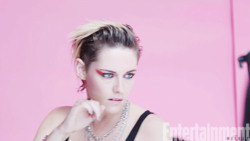
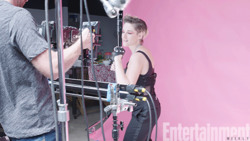
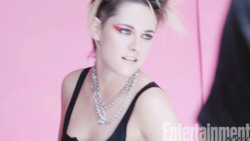
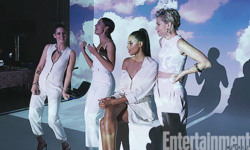
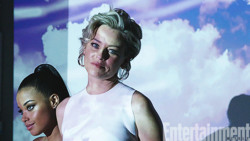
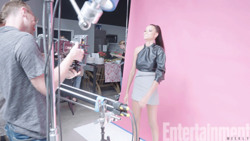

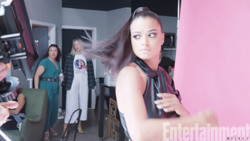
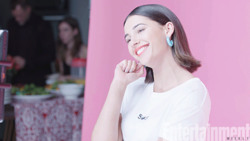
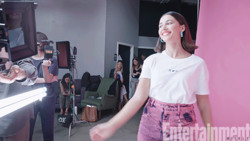
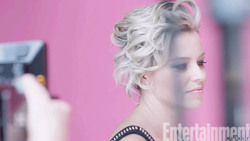
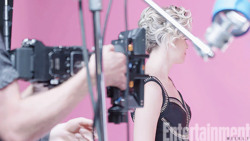
No comments:
Post a Comment
What do you think of this?